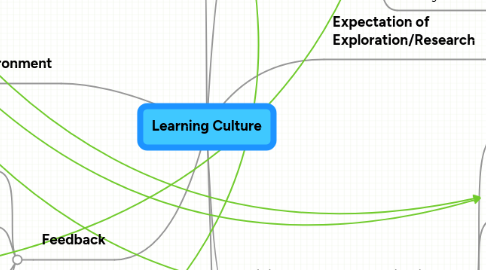Learning Culture
by John Rindy


1. Acceleration Beyond Competition
1.1. Contant learning, unlike competitors
1.2. Application of appropriate strategies
1.3. Strategic application of technology
1.4. Use of all available resources
2. Feedback
2.1. Feedback is sought
2.2. Employees must be interested in results of customer inquiry and assessments
2.3. Forums where performance is disseminated
2.4. Creation of appropriate measurement instruments to garner critical information
3. Leadership
3.1. Deliberate creation of sharing systems
3.2. Model and support learning at all levels
3.3. Metacognitive analysis as leader considers reason for actions and though
3.4. Informed by the process, by dialogue and by shared learning
4. Environment
4.1. Spaces/areas for informal learning
4.2. When necessary, technological solutions for information sharing
4.3. Opportunities to learn from the broader community
4.4. Opportunities and expectations to learn from other departments or service units
5. Communication
5.1. Successes and failures openly shared
5.2. Knowledge in not a personal asset, it is to be shared
5.3. Knowledge not resticted by territorialism
5.4. System of shared learning
5.5. Decisions are made as part of a dialogue
6. Individual/Group/Organizational
6.1. Individuals acquire skills and knowledge
6.1.1. Inquiry and dialogue
6.1.2. Passion
6.1.3. Belief in mission
6.2. Collaboration and construction of new knowledge
6.3. Integrated learning through sharing between individuals and groups
6.3.1. Diversity
6.3.2. Teamwork
6.3.3. Cohesion
6.4. Behaviors and constructs and understanding of social keys to knowing
6.4.1. Toleration of ambiguity
6.5. Retained organizational knowledge
6.5.1. Training/orientation and welcome program for new group members
6.6. Traditions, celebrations, rituals
6.6.1. Major milestones, annual achievements and rites of passage are recognized as a group.
